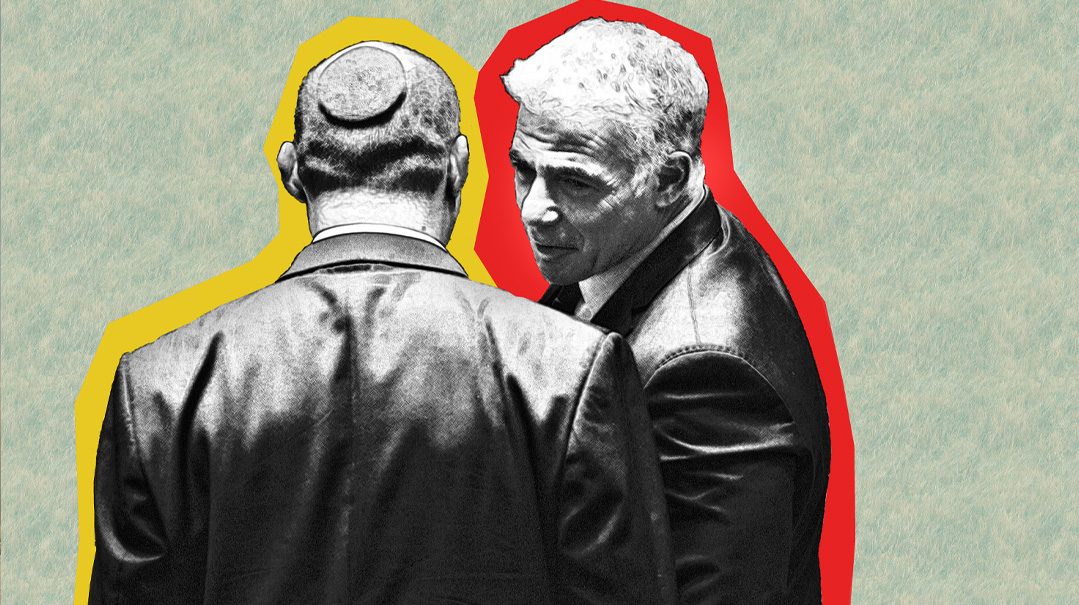Death by a Thousand Cuts


Likud insider MK Yoav Kisch shares new details of the Likud’s quiet efforts to bring a fatally flawed coalition to its end

“The longest funeral in history,” was Bibi’s lacerating description of the Bennett-Lapid government’s slow toppling last week.
But after being born with congenital defects in the shape of irreconcilable coalitions partners, and suffering through a torturous political lifespan punctuated by frequent close calls, the funeral cortege for this perpetually flawed coalition has almost reached its final destination.
In a move that stunned Israel’s jaded political system, co-prime ministers Naftali Bennet and Yair Lapid — who’d spent weeks reacting to events like punch-drunk boxers — seized the initiative by announcing a vote to dissolve the Knesset and pave the way for fresh elections in October, Israel’s fifth in three and a half years.
The agreement between Bennett and Lapid hands the latter the prime minister’s office — a post many had thought permanently beyond his reach — completing Bennett’s betrayal of his voters, after promising them that he’d never serve under the former TV anchor, a heavyweight of Israel’s center-left.
Israel is now so deep into uncharted political waters that no one can say what really lies ahead. But the slow-motion collapse that this government has undergone, including the blindsiding of senior partners like Benny Gantz and Ayelet Shaked, will be analyzed by pundits for what it says about the road ahead.
Two main factors delayed the inevitable collapse of Bennett and Lapid’s hybrid government. The first was the realization by many of its members that the alternative for them was either political oblivion in fifth elections or another bitter four years on the opposition benches.
The second factor, of course, was the government’s willingness to subordinate the treasury to the whims of any rebellious MK. Any crack in the coalition’s ranks could thus be fixed overnight, by simply throwing more money at its pet cause. This reality made Binyamin Netanyahu and Aryeh Deri’s quest to topple the government almost impossible.
The first to separate himself from the governing pack was Yamina MK Amichai Chikli. It seems strange that the one man who hadn’t grown up in the ranks of the dati-leumi world was the first to leap into the waters, like Nachshon ben Aminadav in the Midrash. His firm stand and immunity to political temptation were key in ensuring the government’s instability from day one.
Next came Idit Silman, not someone widely seen as a candidate for defection. Just the opposite: Deri and Netanyahu had written her off from the start. But time proved otherwise, and Silman’s defection paved the way for the government’s disintegration by encouraging its leftist elements to do some grandstanding of their own.
Last came Nir Orbach, a close Bennett ally, who, after very public agonizing, concluded that his credentials as a right-winger would be reduced to zero if he stayed a moment longer in a coalition that was clearly a plaything of leftist Meretz and the Islamist Ra’am party.
Unwieldy as it was, the coalition didn’t just collapse under the weight of its own Frankenstein-esque contradictions. It died a death of a thousand cuts, impaled on the bayonets of the most militant opposition in Israel’s political history.
Over the past few months, Bibi-confidant and Likud MK Yoav Kisch has been on the front lines of that battle to bring down the coalition. He has worked tirelessly to keep the opposition in fighting form, corralling flagging MKs with carrot and stick, cajolery, and arm-twisting.
As he watches his insurgency pay off, Kisch says that the experiment of a left-right government has failed; that parties such as Ra’am which remain fundamentally hostile to Israel have no place at the country’s top table; and that what Netanyahu couldn’t do in the first four elections, he’ll finally pull off in the fifth.
This has been a great week for the opposition — and no doubt for you personally as well, as someone intimately involved in the opposition’s maneuvers in the Knesset. What role did you play in toppling this coalition? Because you were working on two fronts — the coaltion was plagued by both unstable right-wing element and an unstable left-wing element. Share some of the inside story of how you’ve brought this coalition to the brink of collapse.
“I’m not at liberty to disclose everything at this stage, but I’ll remind you of the period after the government passed the budget: Everyone said the government had stabilized and the opposition would collapse. In reality, the exact opposite is what happened. We’ve seen a strong and cohesive opposition with a clear agenda, facing a crumbling coalition.”
We all remember Bennett standing on the runway before his flight to Washington and predicting the opposition’s collapse. So let’s try to reconstruct how this remarkable turnaround occurred.
“What happened was the reverse of Bennett’s prediction. The national camp is highly cohesive. We all agree about the damage being caused by this coalition, and thus all of our MKs understand implicitly why they couldn’t cooperate with it. That shared understanding essentially forged the opposition into an iron fist.
“That’s on a macro level. But at the end of the day, you keep an eye out for areas where the coalition is struggling, and you find that it’s often in the little things. I’ll give you an example of an important decision I pushed for that had an immediate impact. The opposition chiefs ruled unanimously to ban our MKs from agreeing to cover for ministers by abstaining when the latter couldn’t make it to the plenum. [This is an informal arrangement known as kizuz, meaning “offset”; if a coalition member can’t be present for voting, the opposition will agree to have one of its MKs abstain from voting, in order to expedite Knesset proceedings —Ed.] They had the Norwegian Law to bolster them, but we stood our ground.”
Wait a second, ministers who resigned from the Knesset in accordance with the Norwegian Law don’t have to be present at Knesset votes…
“Yes, I’m talking about ministers who remained in the Knesset: Bennett, Lapid, Gantz, Merav Michaeli, Meir Cohen — they had to be present at every vote we contested. After all, what would happen if the ministers were covered by abstention deals? We would be stuck in the Knesset with the coalition’s rank-and-file MKs, while the leaders laughed at us. As far as they’re concerned, let the losers sit there all night. But this grueling war of attrition, in which they had to come every time, because every vote counted, helped us grind down the coalition and significantly slow its legislative schedule.”
We heard that last week you asked Netanyahu to call a certain Knesset member who’s abroad, and Bibi in fact called to interrogate him: “Why aren’t you voting? Why aren’t you in the Knesset?” He didn’t hang up until he was convinced that he had good reason to be absent. And this wasn’t the only case. We take it that there was an intense effort behind the scenes to corral every opposition MK.
“I won’t enter into the details of a particular personal case, but we definitely worked closely with every opposition MK who was unable to be present, creating situations where the government committed itself only to lose. And Baruch Hashem, we succeeded.
“The second thing I started to explain about abstention deals [kizuz] is that the moment you deny ministers this expedient, you start causing problems for them in the plenum. So you get a legislative traffic jam, among other reasons due to mistakes by the coalition.
“For example, here’s one big mistake they made in the last Knesset session. The MKs responsible for advancing government legislation were from New Hope and Yesh Atid, and due to the bottleneck caused by our tactics, they gave priority to their ministers’ bills and sidelined those of Blue and White. So toward the end of the session, Blue and White found itself without a single significant piece of legislation to its name. The result was that the party announced that it wouldn’t show up to votes until their bills were respected. So another conflict arose in the coalition. One step a time, it started coming apart at the seams.”
Let’s talk about two “clients” of yours, Naftali Bennett and Yair Lapid. Tell us how you managed to undermine their leadership, to turn their own followers against them and shake their edifice from within.
“I don’t think the two men fall in the same category. Naftali Bennett took MKs elected to advance a right-wing agenda and made liars of them. They had to lie to their own voters. There’s only so long this could hold together. The first to say, ‘Enough, I’m not doing this,’ was Amichai Chikli.”
Let’s pause a moment over Chikli, because it seems that now the Likud is promising slots on its next Knesset list to every defector, but the pioneer, the Nachshon ben Aminadav, won’t be able to run in an existing party, because he’s been declared a defector by his party. How do you make sure that he doesn’t end up paying for his loyalty to the Right?
“We’re taking care of it. The Likud will insist on his reinstatement, and the declaration was completely illegitimate. The real defectors in Yamina are the ones who are finally beginning to remember their principles and the promises they made to the public. But the declaration of Chikli as a defector is a dirty political move, which should never have happened and must be rectified. Without promising slots — it’s illegal, anyway, and we don’t do that — the Likud will stand by Chikli. At the same time, if anyone in Yamina deserves a reserved slot in a given constellation, it has to be Chikli, and when the time comes, our view is very clear.”
Now let’s get back to Bennett and Lapid. You were explaining the differences between them.
“Bennett took a group of people and conned them, and it exploded in his face. Lapid has managed to keep his people in line. By the way, almost everything he’s done in the government is the exact opposite of what he promised. For example, he promised a small government, and his is the most bloated in history. He said there wouldn’t be coalition money, and he took more coalition money than anyone. He said there would be no ‘equal-representation’ government [like there was in the ill-fated Likud–Blue and White national unity government], he derided Gantz for accepting the office of alternate prime minister, and became the alternate prime minister himself.
“But despite the fact that he’s done everything he condemned, his faction is still firmly behind him, and there are no perceptible cracks there. Unlike Bennett, who took a party with a right-wing platform, eviscerated it, and led it over the lines to the left, only for the whole thing to fall apart.”
You’re the one who alerted Netanyahu when Silman defected, advising him to convey his personal admiration for her move. And those in the know say that you gave him the idea to call Smotrich too, so he wouldn’t feel left out. How were you really able to pry Bennett’s closest confidants away from him?
“I’ll say again, I prefer not to get into particular events, but in general I can say that Yamina was the most unstable faction in the Knesset, and rightly so. Because Bennett led his people somewhere they don’t belong. I’ll give you an extreme example: the Judea and Samaria regulations. The government couldn’t pass this most basic of laws.”
There’s one problem with your narrative: There are three right-wing parties that left the national camp after their leaders’ relations with Netanyahu deteriorated, Lieberman, Bennett, and Saar. Even as we face new elections, it won’t be easy for the right-wing camp to achieve a majority of 61 seats without any of these three parties. We know that from the polls and from previous elections.
The big question is whether you’ve thought of going for some kind of reconciliation on the right, for some kind of appeal on Bibi’s part to tone down the animosity. After all, these men all grew up under Netanyahu’s wing, and as Gideon Saar’s campaign manager in the Likud primaries, you might be best suited to bridge this divide.
“I haven’t spoken with Gideon since he left the Likud. I’ll confess that I wouldn’t be able to support such a move. In my view, those who desert the Likud have made a big mistake, so I can’t play any part in a reconciliation effort.
“But let me raise two points about what you’ve said. One, the reason they’ve boycotted Netanyahu is the trial, and you see how trumped up the charges were, how rife the whole process was with lies and fabrications, from investigations being launched without the authorization of the attorney general, to feeding state witnesses false narratives and lies. With every passing day, we learn more about how these charges were cooked up to bring down Netanyahu as head of the right. And unfortunately, now that the left has demonized him, Bennett with his ambitions and Saar with his personal issues have exploited this for their own purposes.”
Let’s stick to pure facts. Bennett says that he only did what he did when there was no alternative but fifth elections.
“Let me put this bluntly: a right-wing government was a viable option, and Bennett took his votes across the aisle because he wanted to become prime minister. And what we got was a failed prime minister, the shortest-serving prime minister in Israel’s history.”
You haven’t yet mentioned Ayelet Shaked. Does this mean the door is open for her return?
“It’s true that Ayelet Shaked hasn’t behaved quite like Bennett and Kahana, but still, I can tell you that she was the driving force behind this government of shmad.”
Government of shmad? Are you sure you don’t want to reword that?
“Yes, government of shmad! That’s what I call a government that brings the Muslim Brotherhood into the corridors of power in Israel, while other countries have ruled them illegal. Shaked is an accomplice in this. I’ll oppose her entrance to the Likud. If she supports a Likud government from outside the party, like New Hope — that’s a different story.”
Aren’t you declaring victory a bit too quickly? Remember that you failed to form a stable government four times. Why would you succeed the fifth time?
“The answer is clear. During the previous four rounds, Netanyahu and the Likud were still in power, and people didn’t understand the stakes. Today, after just one year, people see the collapse in the Negev, they see the price of freezing the Kaminitz Law, of the electricity law, they see money going to the Muslim Brotherhood, they see women removing the Israeli flag from their cars because they’re afraid they’ll be attacked by Arabs.
“What haven’t we seen during this government’s rule? It even reached the point of Palestinian flags flying at Israeli universities. Everything’s in the open now. It took the public a year, and now they understand. I hear it on the street. We’ve been ruled by a government of shmad for an entire year, and the public now has their chance to set things straight.”
And can you confirm that you won’t sit with Ra’am under any circumstances?
“Absolutely. I’m telling you, Mansour Abbas is the most dangerous man in the Knesset. He smiles and talks and looks friendly, but he’s taking money for the most dangerous purposes, leading the Arab public to the most dangerous places, fighting against the Jewish identity of the state with all his might. We have to take him out of the political consensus that these failing politicians have brought him into. He’s not a partner — he’s exactly like the Joint List, if not worse.”
We’ve spoken about Mansour on the left, let’s talk about Ben Gvir on the right. Is he a worthy candidate to be a minister in a Netanyahu government? Is it legitimate for a disciple of Kahana to become a minister of the State of Israel?
“I don’t hand out portfolios and I don’t build coalitions. From my personal acquaintance with Ben Gvir in the Knesset, the left has tried to make him into something he’s not. He’s fighting for important and moral causes, I have no idea about portfolios.”
Are you being too optimistic? Remember, we’ve seen too many crises in the right-wing camp caused solely by Netanyahu’s inability to maintain functional interpersonal relationships. It’s happened with too many people: Saar, Bennett, Shaked, Elkin. And they aren’t the only ones.
“I don’t accept that. Let me put it bluntly: Bennett and Shaked planned this whole thing due to pure political ambition. It wouldn’t have made a difference whether it was Netanyahu or someone else. Listen, I’m not blind to the interpersonal aspect. But at the end of the day, Bennett and Shaked made a rational, calculated decision to betray the right, to take their Knesset votes and form a government in which Bennett could become prime minister.
“They thought they could get away with it. They made two big miscalculations. One, they expected the prime minister’s office to give Bennett an aura that would elevate him to 15 to 20 seats. It didn’t happen. The man was revealed as a fraud. Two, they thought the trial would damage Netanyahu’s standing and dent his support. That didn’t happen either. The charges were shown to be cooked up. Netanyahu’s repeated statement, that ‘nothing will happen because nothing happened,’ was vindicated. And so it’s irrelevant.
“These are two people who made a conscious decision to harm the right, and in my view they need to pay for this decision. Now we’re going to see their voters returning to the right. It’s not a coincidence that the Likud has been polling at 60 seats while Bennett’s government crumbled. That didn’t come out of nowhere.
“Now we need to bring people to the right-wing camp and get them out to vote, and I’m telling you that we’ll even get 61. The right wing, not just the chareidi public, understands the price our country has paid for a government not led by the Likud, and the cost of people as inexperienced and incapable as Lapid and Bennett running the country, and I’m convinced we’ll see that understanding play out in the next elections.”
(Originally featured in Mishpacha, Issue 916)
Oops! We could not locate your form.







